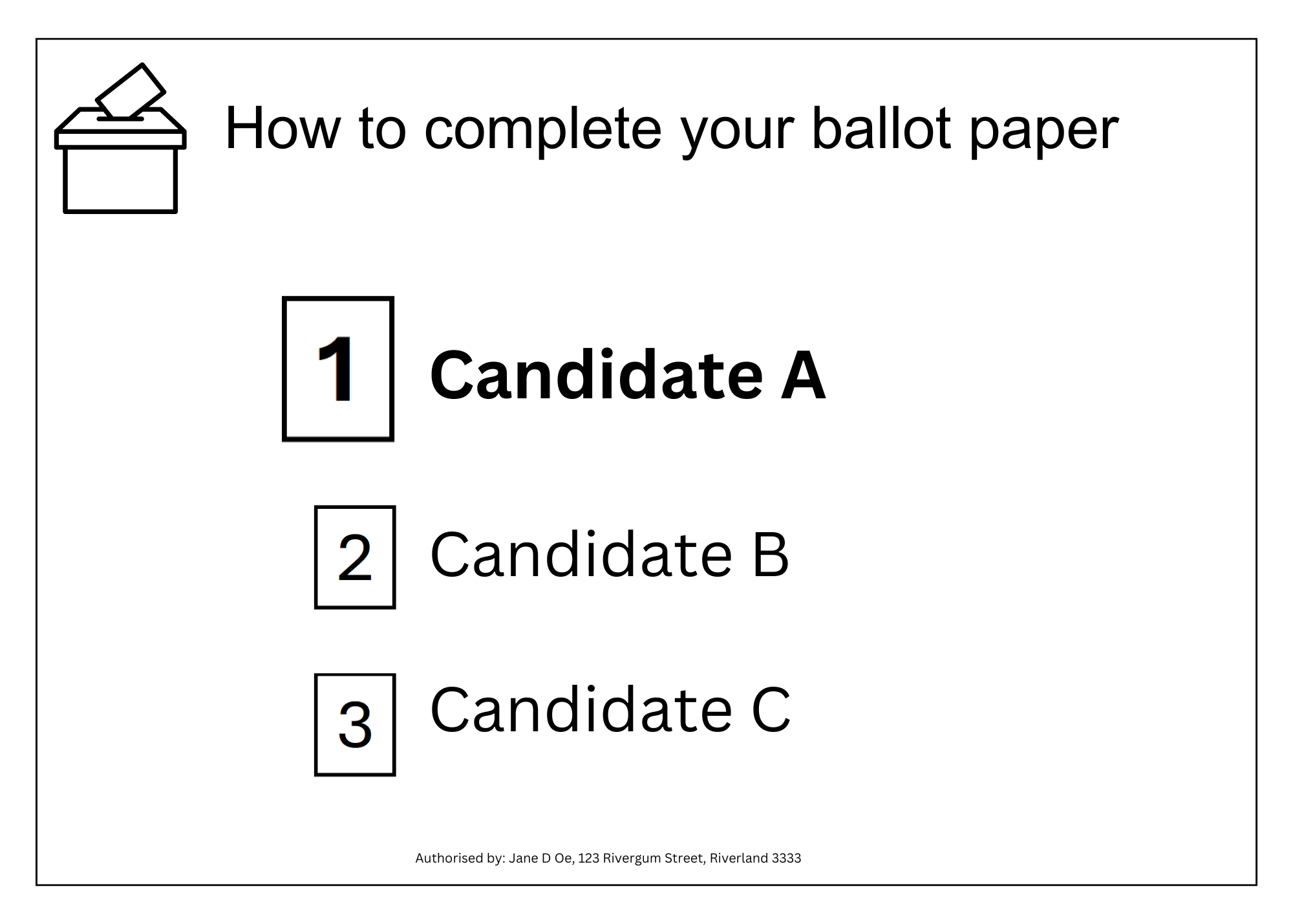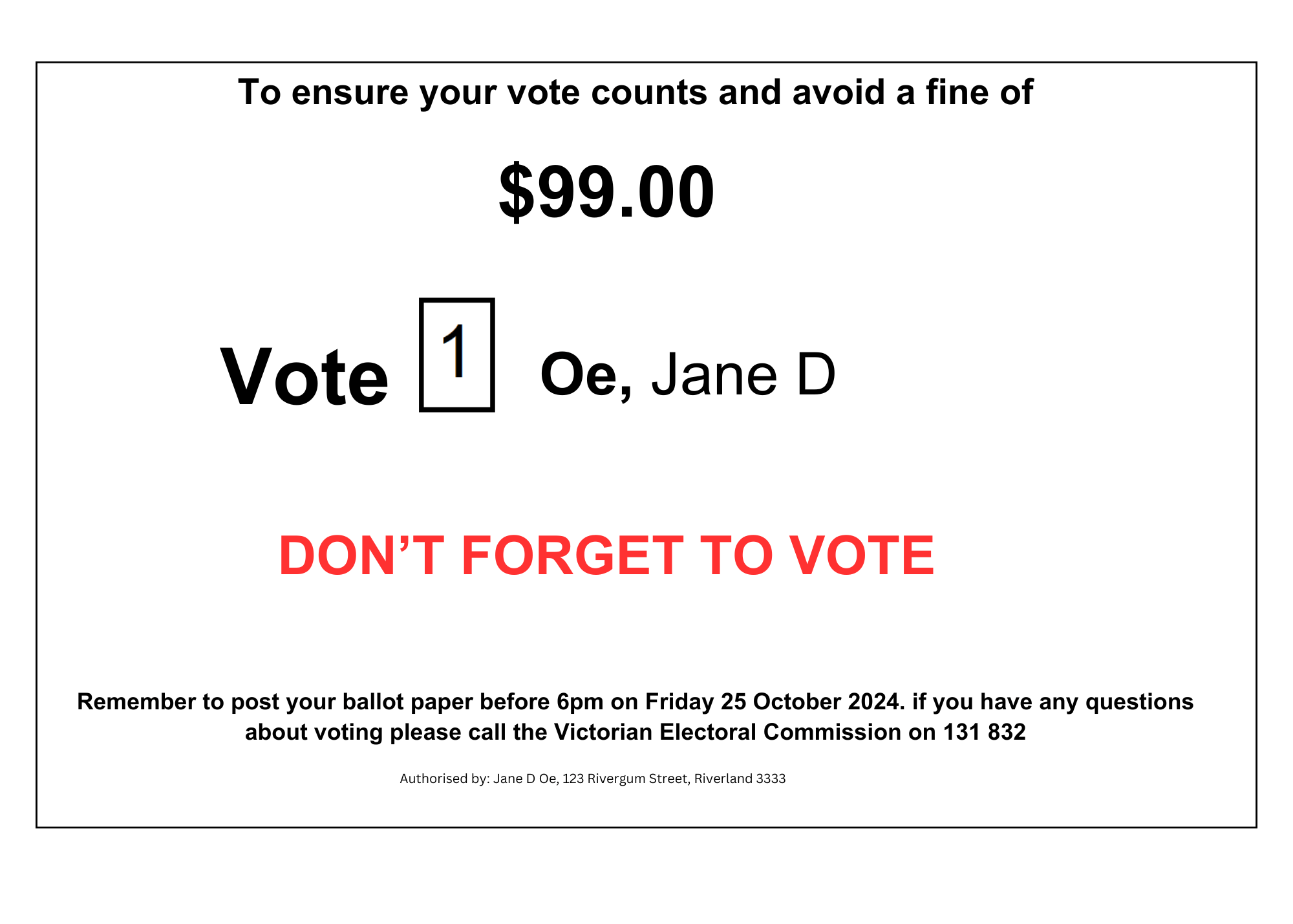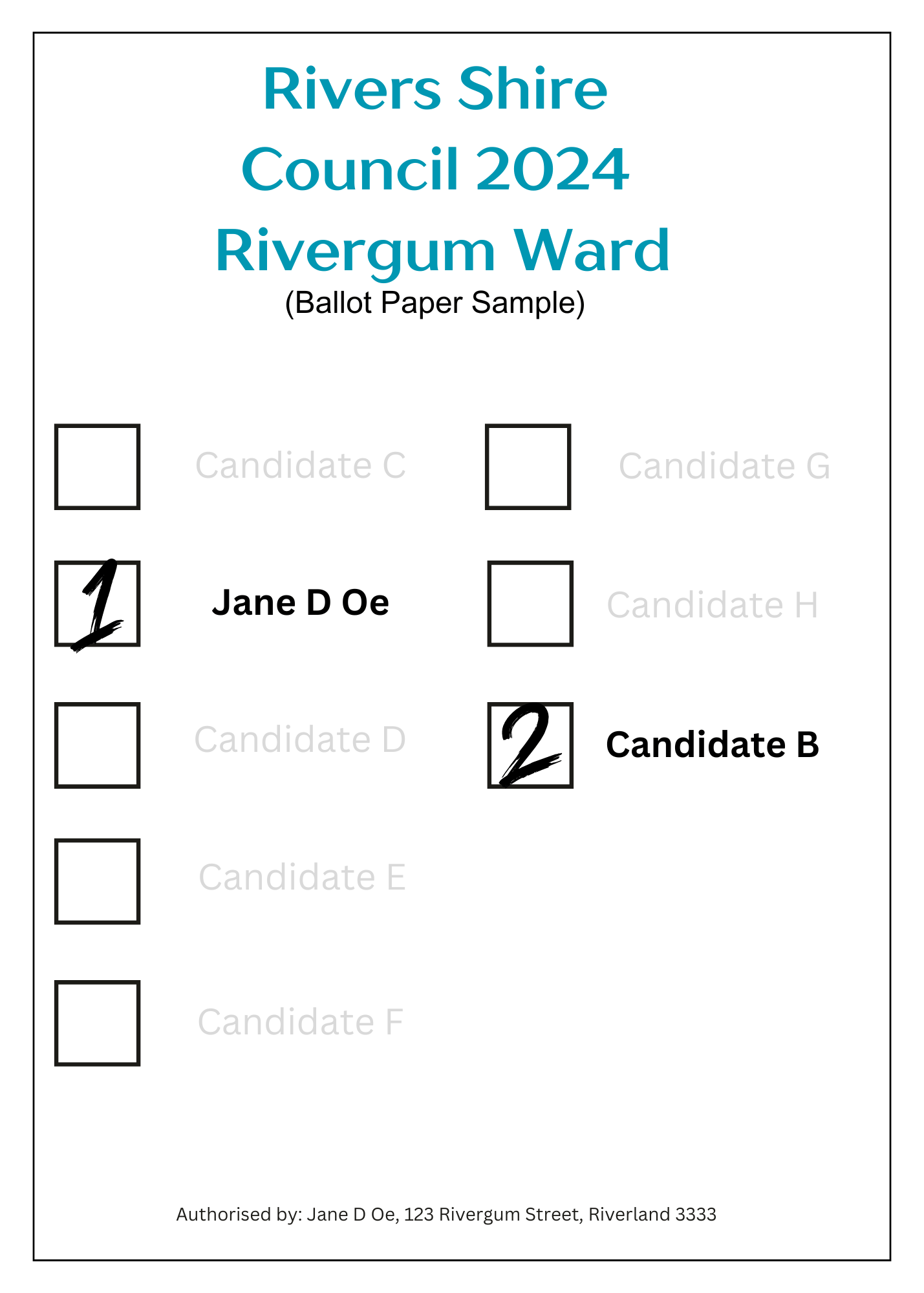- Published:
- Tuesday 17 September 2024 at 1:30 pm
Preamble
This document outlines how the Local Government Inspectorate (LGI) intends to perform its duties and functions and exercise its powers specific to section 288 of the Local Government Act 2020 (Vic) (Local Government Act).
Section 288 of the Local Government Act governs when material is misleading and deceptive:
- Section 288(1) prohibits a person printing, publishing or distributing material that is likely to mislead or deceive a voter in relation to the casting of their vote.
- Section 288(2) prohibits a person printing, publishing or distributing electoral material containing a representation or purported representation of a ballot paper that is likely to induce a voter to mark their vote other than in accordance with the directions on the ballot paper.
The LGI enforces the prohibition against printing, publishing or distributing misleading and deceptive material to ensure members of the public cast formal votes with candidates listed in the order of their preference, and do not cast informal votes which are not able to be counted.
This requirement always applies, not just during an election period. It applies to all people, not just candidates and registered political parties.
Audience
The principal audience for this Enforcement of Local Government Act 2020 – Section 288 document includes:
- Candidates
- Political parties
- Community groups, political parties or ratepayers' associations
- Anyone printing, publishing, distributing material.
Misleading and Deceptive Material
Section 288(1)
For material to be considered misleading or deceptive within the meaning of section 288(1) of the Local Government Act, it must be likely to likely to mislead or deceive a voter in relation to the casting of their vote.
The Courts have interpreted the phrase “in relation to the casting of the vote” narrowly.
In the leading case of Evans v Crichton-Browne (1981) 147 CLR 169, the High Court held that the words “in or in relation to the casting of his vote” in then section 161(e) of the Electoral Act 1918 (Cth) were limited to:
“… the act of recording or expressing the political judgment which the elector has made rather than to the formation of that judgment. It would no doubt be too narrow to regard the casting of the vote as the mere act of putting the paper in the ballot-box - the words would appear to refer to the whole process of obtaining and marking the paper and depositing it in the ballotbox. However, the words clearly do not refer to the whole conduct of the election, which begins before and ends after the votes are cast.”
In Peebles v Honourable Tony Burke [2010] FCA 838, the Federal Court held that:
“It is clear from reading the entire reasons for judgment of the High Court in Crichton-Browne that the prohibition in s 329 concerns misleading or deceptive conduct which might affect the process of casting a vote rather than the formation of the political judgment about how the vote will be cast. That is, the section concerns conduct which might, for example, lead a voter either to fail to record a valid vote or to record a valid vote but not for the candidate or candidates of the voter's choice. An obvious example would be information which told a voter how to go about completing the ballot paper which was wrong and would result in the casting of an informal vote.”
In Garbett v Liu [2019] FCAFC 241, the Federal Court held that the words “likely to mislead or deceive an elector” in section 329(1) of the Electoral Act 1918 (Cth):
“… means a real chance of misleading or deceiving any elector, even one who is unintelligent, or gullible, or naïve.”
Courts are concerned with material that is likely to mislead or deceive voters in relation to how they mark their ballot paper, rather than any misinformation which arises through political debate during election periods. It is taken that only statements that affect the actual physical casting of a person's vote (and not statements that affect the formation of a political judgment by the elector) are misleading and deceptive.
Example 1
A candidate distributes electoral material which reads “In the current Councillor term Councillor Jane D Oe voted to close all kindergartens in the Council area.”
The LGI receives a complaint alleging the claim is false, and therefore misleading and deceptive.
The LGI’s position is that this is not likely to be misleading or deceptive under section 288(1) of the Local Government Act.
While the material may affect the formation of a political judgment by a voter, it is not likely to mislead or deceive a voter in relation to how they mark their ballot paper.
Example 2
A ratepayer’s association distributes electoral material which reads “Under the current Council debt has increased 80%.”
The LGI receives a complaint alleging the claim is false, and therefore misleading and deceptive.
The LGI’s position is that this is not likely to be misleading or deceptive under section 288(1) of the Local Government Act.
While the material may affect the formation of a political judgment by a voter, it is not likely to mislead or deceive a voter in relation to how they mark their ballot paper.
Example 3

A candidate distributes material which numbers three candidates consecutively, in order of preference. There are eight candidates in the election. The other five candidates are not listed. The three named candidates are not listed in the order they appear on the ballot paper.
The LGI receives a complaint alleging the material is likely to mislead or deceive a voter in relation to the casting of their vote.
The LGI’s position is that this is not likely to be misleading or deceptive under section 288(1) of the Local Government Act.
The material:
- is not a representation or purported representation of a ballot paper; and
- illustrates the candidate’s preferences, which candidates are entitled to do.
Example 4

A candidate distributes electoral material which reads "To ensure your vote counts and avoid a fine, Vote [1] Jane D Ow".
The LGI receives a complaint alleging the material is likely to mislead or deceive a voter in relation to the casting of their vote.
The LGI's position is that this is likely to be misleading or deceptive under section 288(1) of the Act.
It is likely that the material may lead a voter to believe that"
- they must vote for the candidate to cast a valid vote; and/or
- they must vote for the candidate to avoid a fine
Section 288(2)
For electoral material to be considered misleading or deceptive within the meaning of section 288(2) of the Local Government Act, it must contain a representation or purported representation of a ballot paper that is likely to induce a voter to mark their vote other than in accordance with the directions on the ballot paper.
Example 1

A candidate distributes electoral material which contains a purported representation of a ballot paper with how-to-vote instructions. There are eight candidates in the election. The candidate attempts to number all candidates consecutively, in order of preference, but places the number 5 against two candidates and does not place the number 6 against any candidates.
The LGI receives a complaint alleging the material is likely to induce a voter to mark their vote other than in accordance with the directions on the ballot paper.
The LGI’s position is that this is likely to be misleading or deceptive under section 288(2) of the Local Government Act.
The Local Government Act requires full preferential voting – a voter is to mark their first preference as '1’ on the ballot paper and then number candidates consecutively, in order of preference. Incorrect ballot papers are informal and unable to be counted.
The LGI’s position is that a voter in the election who followed this how-to-vote instruction could mark an incorrect sequence of preferences which would be determined as informal.
Example 2

A candidate distributes material which contains a purported representation of a ballot paper with how-to-vote instructions. The candidate numbers two candidates consecutively, in order of preference. There are eight candidates in the election. The other six candidates are listed in the order they appear on the ballot paper but are not numbered in order of preference.
The LGI receives a complaint alleging the material is likely to induce a voter to mark their vote other than in accordance with the directions on the ballot paper.
The LGI’s position is that this is likely to be misleading or deceptive under section 288(2) of the Local Government Act.
The Local Government Act requires full preferential voting – a voter is to mark their first preference as '1’ on the ballot paper and then number candidates consecutively, in order of preference. Incomplete ballot papers are informal and unable to be counted.
The LGI’s position is that a voter in the election who followed this how-to-vote instruction could mark an incomplete sequence of preferences which would be determined as informal.
Defamatory Material
Defamation means causing serious harm to a person's reputation by publishing material about them that changes the way people feel about them.
While there have been claims in previous local government elections that defamatory material has been printed, published or distributed (see for example Mulholland & Anor v Langdon [2022] VCC 1848), as defamation is a private, civil matter it is not within the jurisdiction of LGI.
A person who believes they have been defamed can seek independent legal advice regarding the options available to them.
Injunction
Under section 305 of the Act, a candidate who believes that “a person has engaged, is engaging or is proposing to engage in any conduct that constitute, constitutes or would constitute an offence under section 287 or 288…” may apply to the Supreme Court for the grant of an injunction “(a) restraining that person from engaging in the conduct; and (b) if in the opinion of the Supreme Court it is desirable to do so, requiring that person to do any act or thing.
Note: this applies only to a candidate in a local government election.
Updated

